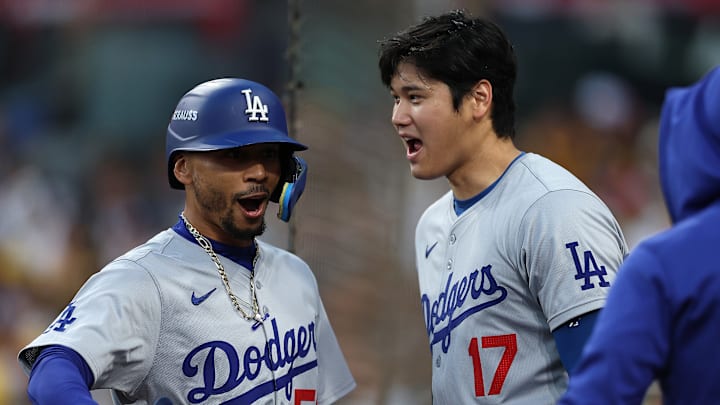Last week, Jayson Stark asked if Shohei Ohtani and Mookie Betts are the best one-two hitters in baseball history. It's a tricky question because there is no perfect way to compare leadoff duos objectively. WAR, which stands for Wins Above Replacement and is the baseball nerd's favorite catch-all statistic de jour, falls flat because it includes a defensive component. On-base Plus Slugging percentage (OPS) is an excellent filter for offense, but it doesn't tell the whole story—advanced stats like OPS+ and common sense reasoning help paint the entire picture.
All Shohei Ohtani has to do to dethrone Rickey Henderson as the best leadoff hitter of the modern era is keep hitting leadoff. During Henderson's 25-year career, he never had an OPS greater than Ohtani's, and it was rare for a team to put their best hitter second. So, despite playing alongside future Hall of Famers and All-Stars like Don Mattingly, Mark McGwire, Jose Canseco, Edgardo Alfonzo, Roberto Alomar, Joe Carter, Jon Olerud, and Paul Molitor, Henderson was never part of a duo that surpassed Ohtani-Betts. He came close several times, including once in the mid-1980s whenhe and Mattingly occasionally hit back-to-back at the top of the Yankees lineup. In 1999, as a 40-year-old with the New York Mets, Henderson and Alfonzo had Betts-like seasons, but neither was an MVP like Ohtani.
,The list of great leadoff men continues in no specific order, with Wade Boggs, Derek Jeter, Pete Rose, Tim Raines, Ichiro Suzuki, and Lou Brock all coming to mind. In the '80s Boggs came close with running mates Jim Rice, Dwight Evans, and Mike Greenwell, and in the '90s with Paul O'Neill.
SHOHEI OHTANI AND MOOKIE BETTS BACK TO BACK TO WALK IT OFF
— Ben Verlander (@BenVerlander) September 22, 2024
pic.twitter.com/2k7jfI9Yad
Tim Raines teamed up with Frank Thomas in 1993, but Thomas never hit second. In 1996, Jeter hit in front of Raines and Boggs, depending on the night. While those guys could all hit for a good batting average, none could match the power of Betts or Ohtani. For all his brilliance in the box, Ichiro was a singles hitter. Lou Brock had speed but never had a season where he surpassed either Betts or Ohtani in OPS.
In 1976, on May 5th against the New York Mets, Pete Rose hit first, and Joe Morgan hit second. 1976 was the year Joe Morgan won the second of his back-to-back MVPs, and Pete Rose made the All-Star team; they had nearly identical OPS as Ohtani and Betts. But that was the only game that season they hit 1-2. Ohtani-Betts were leadoff 115 times. Should a sample size of one qualify? Probably not.
In 1996, Brady Anderson had a miraculous 50-home run season, hitting in front of Hall of Famer Roberto Alomar, leading off for the Baltimore Orioles. Their combined OPS was significantly higher than that of Ohtani-Betts. Anderson doesn't have the same legacy as Ohtani or Betts. He and Alomar might have had the best season, but does that matter if Ohtani and Betts end up with seasons two through ten?
In the 1940s, Negro League stars Josh Gibson and Buck Leonard played together with the Homestead Grays, but we have no record of the batting orders. They may be the best leadoff-duo ever; we'll never know.
Placing your best hitter second is emerging as conventional baseball wisdom. In 2023, the Atlanta Braves had Ronald Acuna Jr. in front of Matt Olson, and the San Diego Padres had Fernando Tatis Jr. before Juan Soto, two duos in the same tier as Ohtani-Betts. From 2018-2022, Ohtani sometimes hit1-2 with Mike Trout, and Trout is better than Betts. As teams shift their lineup-building philosophies away from the traditional model and towards an approach that guarantees their best hitters the most at-bats, leadoff duos remain turbocharged. To say Ohtani-Betts is the best is premature. To be the best, you must put your name in the record books, and after only one season of leading off, Ohtani and Betts haven't done that yet.
